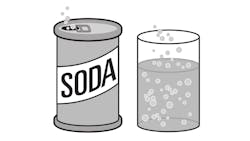Carbon dioxide shortage threatens UK soft drink production
Soda and food producers were warned last week to prepare for a 400% rise in carbon dioxide prices sparked by skyrocketing costs of wholesale natural gas.
Reuters reported that natural gas prices rose steeply this year as economies reopened from COVID-19 lockdowns and high demand for liquefied natural gas in Asia pushed down supplies to Europe impacting all industries dependent on the energy source.
Carbon dioxide (CO2) is a by-product of the fertilizer industry, where natural gas is the biggest input cost, Reuters explained. Energy and chemical companies get their CO2 mainly from fertilizer plants.
Last week the British Soft Drink Association warned that drinks manufacturers may have only a few days of CO2 supply left in reserve, and most CO2 suppliers were not scheduling beyond 24 hours in advance. If soft drink manufacturers cannot get hold of CO2 supplies after their reserves have run out, production of certain products will have to cease.
“The government must add the wider food and drink sector to the priority CO2 supply list on the grounds of maintaining product supply to consumers and protecting British jobs,” the BSDA said. “We urge the government to support the operation of UK fertilizer plants through to the end of the year to stop this issue from rearing its head at Christmas.”
The BSDA added that the soft drink industry has in the past dealt with CO2 shortages, which are not entirely uncommon, but current condition “feel different.” That’s because it is not profitable to produce fertilizer with the sky-high energy prices. And for food and drink businesses, the shortage is taking place amid ongoing logistics and importation issues and the lingering effects of the COVID-19 pandemic.
Coca-Cola Co. said soda production at its Lambeg facility in County Antrim has not been disrupted by the CO2 shortage, according to reports.
In addition to carbonating water, soft drinks and alcoholic drinks, food grade CO2 is used to dispense drinks and beers in pubs; to promote the growth of plants in greenhouses; to stun pigs and chickens before slaughter; for packaging meats, baby foods, fresh foods and baked products (CO2 extends shelf life by preventing bacteria); to keep food fresh in transport (CO2 is used in the form of dry ice and snow).
